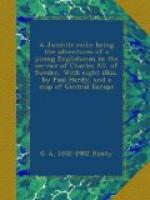“It is easy for anyone to lose his way here,” he said. “In fact, except to one accustomed to the woods, it would be dangerous to go far away from the hut. As long as it is fine, you will find your way back by following your own tracks, but if the weather changed suddenly, and it came on to snow, your case would be hopeless. One of the advantages of placing our hut on a stream is that it forms a great aid to finding one’s way back. If you strike it above, you follow it down; if below, upwards, until you reach the hut. Of course you might wander for days and never hit it, still it is much more easy to find than a small object like the hut, though even when found, it would be difficult to decide whether it had been struck above or below the hut.
“Now, there is one rule if, at any time, you get lost. Don’t begin to wander wildly about, for, if you did, you would certainly walk in a circle, and might never be found again. Sit down quietly and think matters over, eat if you have got any food with you; then examine the sky, and try to find out from the position of the sun, or the direction in which the clouds are going, which way the hut ought to lie. Always take with you one of your pistols; if you fire it three times, at regular intervals, it will be a signal that you want help, and any of us who are within hearing will come to aid you.”
With the exception of hares, of which a good many were snared, the hunting was not productive. Tracks of deer were seen not unfrequently, but it was extremely difficult, even when the animals were sighted, to get across the surface of the snow to within range of the clumsy arquebuses that two or three of the men carried. They did, however, manage to shoot a few by erecting a shelter, just high enough for one man to lie down under, and leaving it until the next snowstorm so covered it that it seemed but a knoll in the ground, or a low shrub bent down and buried under the weight of the snow. These shelters were erected close to paths taken by the deer, and, by lying patiently all day in them, the men occasionally managed to get a close shot.
Several bears were killed, and two elks. These afforded food for a long time, as the frozen flesh would keep until the return of spring. Holes were made in the ice on the stream, and baited hooks being set every night, it was seldom that two or three fish were not found fast on them in the morning.
Altogether, therefore, there was no lack of food; and as, under the teaching of the captain, Charlie in time learnt to be able to keep his direction through the woods, he was often able to go out, either with Stanislas or alone, thus keeping clear of the close smoky hut during the hours of daylight. Upon the whole he found the life by no means an unpleasant one.
Among the articles purchased by the captain were high boots, lined with sheepskin, coming up to the thigh. With these and the coats, which had hoods to pull over the head, Charlie felt the cold but little during the day; while at night he found the hut often uncomfortably warm, sleeping, as they all did, in the same attire in which they went out.




